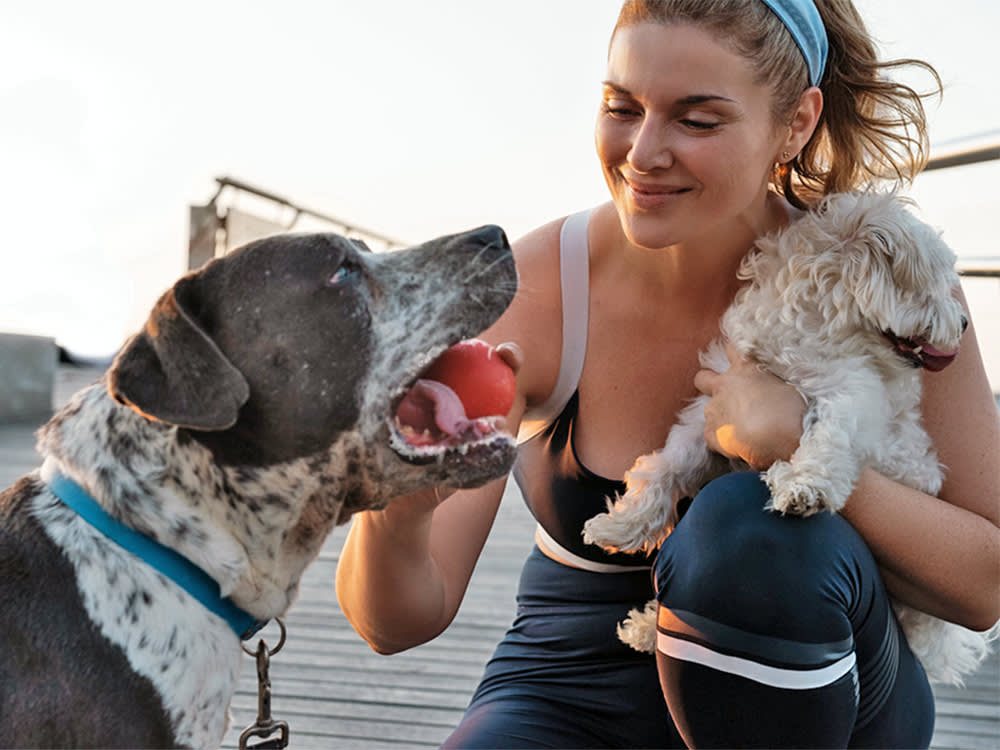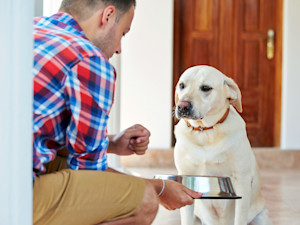Why Does My Dog Foam at the Mouth?
When to see a vet and when you shouldn’t panic.

Share Article
Seeing your dog foaming at the mouth can be an alarming sight, leaving you wondering about the cause and whether it’s a sign of a serious problem. While some instances of foaming at the mouth are harmless, others can indicate underlying health issues that require prompt attention.
10 top reasons dogs foam at the mouth
When dog drool gets thick and frothy, it looks like dogs are foaming at the mouth. If your dog’s mouth is foaming, don’t panic. While rabies has been associated with foaming at the mouth, it’s not the only cause, and is very unlikely if your dog is vaccinated and kept away from wildlife. Here are ten reasons why pups foam at the mouth, some more serious than others.
Overactivity
When it comes to running and jumping, some energetic dogs can overdo it. Playtime and the excitement that comes along with it can cause some pups to pant and drool excessively, causing fun-loving pups to foam at the mouth. Dog parents can use this as a cue to take a water break, before their dog is at risk for heat exhaustion or heat stroke.

Unpleasant tastes
If you’ve ever seen a dog taste a lemon, pickle, or other tart food for the first time, you’ve probably witnessed the intense reaction that can follow — drooling, foaming, head shaking, and an intense look of betrayal. This reaction can happen after tasting any substance a dog finds unpleasant, including insects and medications. If your dog hates their meds, try to make the experience a little more pleasant by incorporating treats or learning how to “pill” your dog.
Oral issues
While heavy drooling can be a sign of dental problems, excessive foaming may indicate a foreign object stuck in the mouth. This can be anything from a stick to a toy fragment. This is more common than you might think; vets often remove sticks lodged across the roof of dogs’ mouths.
Caustic substances
Ingesting caustic substances, whether acidic or alkaline, can cause severe irritation and burns to a dog’s mouth, esophagus, and stomach. This irritation can make a dog painful and nauseous and can cause foaming at the mouth. Caustic substances found in many households include:
Alkaline batteries
Household cleaners
Pool chemicals
Fabric softeners
Potpourri
Licking toads
Toads are weird, lumpy, slow, and make strange sounds, making them very enticing to curious pups. After sniffing around, some dogs will want to put the toad in their mouth for further investigation.
Unfortunately for them, toads also have a defense mechanism consisting of glands that secrete toxins onto their skin. When a dog licks a toad, these toxins cause oral irritation, leading to foaming, pawing, and head shaking. Rinsing a dog’s mouth out with water can help lessen the irritation.
For most toad species, the extent of the effect of their toxin is to be just unpleasant enough to be put down. But two toad species, Colorado River Toads (Incilius alvarius) and Cane/Marine/Giant Toad (Rhinella marinus), release bufotoxins. Bufotoxin can have negative effects on a dog’s gastrointestinal, cardiovascular, and nervous systems. Symptoms include vomiting, high heart rate, disorientation, seizures, and death. Luckily, toads that release bufotoxins are not found everywhere, but dog parents in the southern United States and Hawaii should be familiar with them.
Nausea
Have you ever seen a dog try really hard not to vomit? They get flat ears, worried eyes, and puffed out cheeks, and they smack their lips a lot. Drool starts as tiny drops at the corners of the mouth, but the longer they hold it in, the frothier it becomes. Dogs can become nauseous for a million reasons, including car sickness, dietary indiscretion, metabolic disease, and infection.
Seizures
Seizures in dogs can be caused by neurological disorders, head trauma, toxin ingestion, and metabolic abnormalities. Generalized seizures (those that involve the whole body) can cause stiff muscle twitching, paddling, uncontrolled urination or defecation, and foaming at the mouth.
Focal seizures often manifest in just one part of the body and don’t result in a loss of consciousness. A common presentation of focal seizures in dogs is “chewing gum” seizures, where the jaw opens and closes repeatedly, and dogs can foam at the mouth.
Toxins found in nature
Dogs who roam around (indoors or outdoors) can come into contact with toxic organisms that can cause foaming at the mouth.
Mycotoxins: Mycotoxins are the toxins produced by the fungi that grow on old, moldy food. Moldy food ingestion can cause vomiting, tremors, and foaming at the mouth in dogs. Be sure to keep pups out of trash and compost piles.
Tetanus: Tetanus in dogs is caused by a bacterial infection. The bacteria, named Clostridium tetani, release a toxin that causes muscle spasms and stiffness. This can lead to difficulty swallowing and frothy drool.
Cyanobacteria: Cyanobacteria, also known as blue-green algae, are organisms that live in bodies of freshwater (lakes, ponds, rivers). They produce toxins that can cause potentially fatal symptoms in dogs, including vomiting, foaming at the mouth, liver failure, and seizures. Dogs are most at risk when algae are “in bloom” — causing water to look cloudy or have a layer of smelly plant material on the surface.
House plants: Many popular house plants contain calcium oxalates. When chewed, plants with calcium oxalates can cause oral irritation in dogs, leading to foaming at the mouth.
Breed characteristics
Some breeds like Basset Hounds, Bloodhounds, and Saint Bernards have loose, floppy jowls. But those jowls also come with extra drool and thick saliva can look foamy. While jowly dogs can be cute, the aftermath of a good head shake can be messy.
Rabies
Rabies is a deadly viral disease that affects the nervous system of mammals, including dogs.
Rabies virus causes an increase in saliva production and paralysis of the swallowing muscles, causing infected animals to foam at the mouth. While foaming at the mouth is probably the best-known symptom of rabies in dogs, it's not seen in all rabies cases.
The important things to remember are that the rabies virus is zoonotic (meaning people can be infected) and it’s preventable (so stay on top of those vaccines!).
When to seek veterinary attention
The reasons for dogs to foam at the mouth range from being of little concern to being a big deal. A dog that’s foaming at the mouth should be checked out if additional symptoms are present. Here’s some things that need veterinary attention ASAP:
Persistent foaming at the mouth
Difficulty eating or swallowing
Nausea or vomiting
Pain
Muscle tremors
Weakness
Difficulty walking
Breathing changes
Possible toxin exposure
Injury from unvaccinated animals or wildlife
FAQs (People also ask):
Why is my dog foaming at the mouth and twitching?
There’s no single cause for a dog to be foaming at the mouth and twitching, but these symptoms can be seen with seizures, tetanus, or toxins like bufotoxin or mycotoxins. Dogs who are twitching and foaming at the mouth should be seen by a vet.
Why does my dog foam at the mouth when playing?
Excited dogs will often drool and pant, especially during playtime. When playful dogs drool excessively, the saliva can get frothy, giving the appearance of foaming at the mouth.
Why does my dog foam at the mouth when eating?
In dogs, excessive drooling and foaming at the mouth while eating can be a sign of dental issues. Periodontal disease or any issue causing a dog oral pain can be more apparent during meal time.
References:

Dr. Alycia Washington, DVM, MS
Alycia Washington is a small-animal emergency veterinarian with over 10 years of experience based in North Carolina. She works as a relief veterinarianopens in new tab and provides services to numerous emergency and specialty hospitals. She also works as a veterinary writer with a focus on educating pet parents.
Related articles
When Can a Puppy Get a Rabies Shot?
And what you should expect after they receive it.
![A happy woman is lying on a bed, her dog smelling her face.]()
9 Diseases You Can (and Definitely Can’t) Catch From Your Dog
Here’s what you can scratch off your “Worry About This” list.
Why Does My Dog Keep Licking Their Lips?
It’s not always just because they want whatever you’re eating.
![Woman kisses her black pit bull dog on the head.]()
What Can I Give My Dog for an Upset Stomach?
It stinks to see them uncomfortable. Here’s what you can do.
![Man trying to tempt dog to eat his kibble.]()
How Long Can Dogs Go Without Eating?
If you ask them, they would say they should be eating always. But here’s the truth.
What Can I Give My Dog for Diarrhea?
It’s not fun for anyone.
Is Lawn Fertilizer Toxic to Dogs?
It keeps your grass lush and green, but your pup shouldn’t ingest it. Here’s why.









